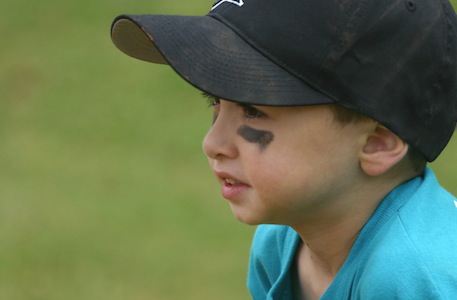This originally appeared on The Achilles Effect. Republished here with permission.
About a year ago, Lisa Bloom wrote an article called “How to Talk to Little Girls” in which she encouraged her readers to talk to young girls about who they are and what they do rather than how they look.
I would like to borrow her idea and apply it to boys, specifically as it pertains to the word tough. I have written before about the frequent appearance of this word on boys’ t-shirts, but an incident at a little league baseball game got me thinking about the word again.
At the game, the first of the season, there was a scramble for the ball. In the ensuing scrum, a boy was hurt. He began crying. The coach told him that he’d be fine because he’s “a tough little guy” then gave him an approving pat on the back when he decided to stay in the game. The boy was five years old.
The coach spoke kindly to the boy and did not sound as though he was trying to shame him, but still, that word in that context has broad implications: no time for tears, pull yourself together, suck it up, and get back in the game. Would the same expression have been used for a kindergarten-aged girl? Hard to say, but I doubt it.
I heard the statement from across the diamond so I know that most other boys at the game would have heard it too (if they were listening, which is never a guarantee with children of this age).
What is the message for that boy and any others who heard the coach? Crying is not “tough” and, therefore, not something boys should do.
Boys are inundated with messages telling them that they must appear tough at all times and that crying—whether from being hurt, scared, or tired—is not an acceptable reaction for a boy. Hearing it from a little league coach is bound to have an impact on a young boy.
What could the coach have done differently? Perhaps he could have asked the boy whether he was hurt or scared by the massive pile-on of eight little bodies in pursuit of a ball. A little sympathy probably would have been of great comfort to the boy. Maybe he could have asked if the boy wanted a break from the game instead of implying that he should tough it out and get right back in there. Instead he (unwittingly, I’m sure) delivered a message about how wrong the boy’s reaction was.
Tough is just one word, but what a weight it carries. I urge all adults, little league coaches or not, to think twice about its deeper meaning when talking to boys.
Crystal Smith is a social media and marketing writer who has spent many years working with non-profit agencies seeking gender equality and an end to discrimination against women. After being regularly disappointed by the gender portrayals in the film and television marketed to her two young sons, she decided to write about the impact of kids’ popular culture on young boys’ ideas about gender and masculinity.
Related Links:

